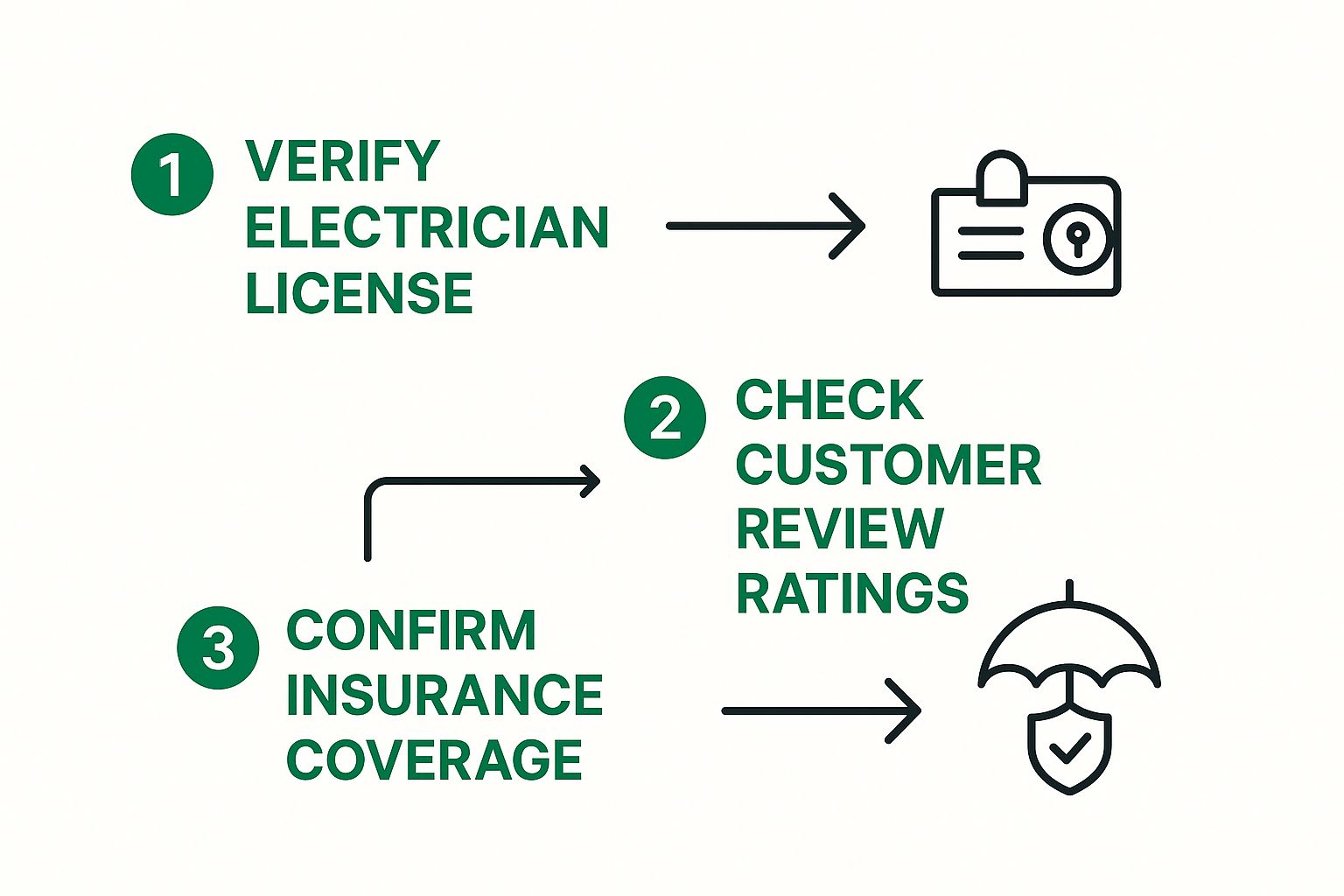Key Takeaways
- Always Verify Credentials: The first step is to confirm any potential electrician has an active license, bond, and insurance through the Washington State Department of Labor & Industries (L&I) website. This is non-negotiable for safety and compliance.
- Prioritize Local Expertise: A local Washington electrician, like Phase3Electric, understands regional codes, common issues in older homes (like knob-and-tube wiring), and has a community reputation to uphold.
- Read Reviews Intelligently: Look for consistent patterns in online reviews. One bad review isn’t a deal-breaker, but multiple complaints about the same issue (e.g., poor communication, missed appointments) are a major red flag.
- Get Detailed Written Estimates: Never accept a verbal quote. A professional estimate should be a detailed document breaking down the scope of work, material costs, labor rates, and a project timeline.
- Ask Specific Questions: Inquire about their experience with your specific type of project, whether it’s an EV charger installation, a panel upgrade, or working on an older home. Clear, confident answers are a sign of a true professional.
Finding a great electrician in Washington State shouldn’t feel like a shot in the dark. The secret is knowing what to look for: verifying their state credentials, checking what your neighbors are saying about them, and making sure they communicate clearly from the very first conversation.
A true professional will never hesitate to show you their license and insurance information. These aren’t just pieces of paper; they’re your assurance of safety and quality work. At Phase3Electric, we believe in this transparency—we’re the local experts who actually answer the phone, combining technical mastery with genuine care for our Washington communities.
Finding a Washington Electrician You Can Rely On

When an electrical problem strikes—a constantly tripping breaker in your Seattle condo or the urgent need for a generator hookup before a storm in Snohomish County—it’s easy to feel the pressure. But rushing to hire the first person you find can be a costly mistake. You’re not just hiring someone to fix a wire; you’re trusting them with the safety of your home and everyone in it.
Shoddy electrical work is no small thing. It can lead to some serious dangers, like electrical fires, unexpected power outages, or even injury. Hiring a certified, dependable electrician means you can rest easy knowing every connection is solid and all the work meets Washington’s rigorous building codes.
Why Local Expertise Matters in Washington State
There’s a real advantage to hiring a local expert. Companies like Phase3Electric aren’t just working in your town; they’re part of it. We understand the specific challenges of our Washington communities, from the old knob-and-tube wiring in historic Seattle homes to the specific permitting rules in King or Skagit counties. Unlike faceless corporate competitors, a local pro’s success is tied directly to the community’s success.
The real mark of a great electrician isn’t just technical skill—it’s reliability. Do they answer your call? Do they explain the problem clearly? This level of service is what separates a true professional from the rest.
A local electrician’s reputation is their most valuable asset, built one job at a time. They know that doing great work in Bellevue today often leads to a referral in Everett tomorrow. That community accountability is something you just don’t get from a faceless national chain.
Quick Vetting Checklist for Washington Electricians
Before you even pick up the phone, you can do a quick background check to weed out any unqualified candidates. This simple step saves a ton of time and ensures you’re only talking to legitimate, skilled professionals.
Use this checklist to quickly qualify potential electricians.
| Checklist Item | Why It’s Critical for Safety | Where to Verify |
|---|---|---|
| Active WA State License | Confirms they have met the state’s strict training and knowledge requirements. Unlicensed work is illegal and unsafe. | Washington State Dept. of Labor & Industries (L&I) website. |
| Bonded and Insured | Protects you from financial liability if an accident or property damage occurs during the job. Never skip this. | Ask the company directly for their Certificate of Insurance (COI) and bond number. |
| Positive Local Reviews | Gives you real-world insight into their work quality, professionalism, and reliability from people in your community. | Google, Yelp, and local Facebook groups. |
Taking just 15-20 minutes to run through these checks can save you from major headaches, unexpected costs, and serious safety risks down the road. It’s the smartest way to start your search.
Starting Your Search with Local Reviews and Referrals

Before you even think about opening a web browser, start with the people you already trust. Your best bet for finding a great local electrician often comes from good old-fashioned word-of-mouth.
Talk to your neighbors, friends, and family in Washington. You can even ask the seasoned staff at your local hardware store in places like Lynnwood or Marysville. People love to share their experiences, especially when a contractor has done a fantastic job—or a terrible one.
When you ask for a name, don’t stop there. Dig a little deeper to make sure their recommendation is actually a good fit for your project.
- “What kind of work did they do?” You need to know if they handled a simple outlet fix or a complex full-panel upgrade.
- “Were they punctual and professional?” Ask if they showed up on time and how they communicated any delays.
- “What was the cleanup like?” You don’t want to be left with a mess.
- “Any surprise costs?” Find out if the final bill matched the initial quote.
Getting answers to these questions gives you a much clearer picture of what to expect and helps you filter out electricians who might not be right for your specific needs.
How to Actually Use Online Reviews
Once you have a few names from people you trust, it’s time to head online to expand your list and do some more digging. Sites like Google and Yelp are goldmines of information, but you have to know how to sift through it all.
Don’t get hung up on a single amazing review or one scathing complaint. Instead, look for the story the reviews tell together.
A real red flag isn’t one bad review; it’s seeing the same complaint over and over. If multiple people mention missed appointments, sloppy work, or poor communication, pay attention. On the flip side, consistent praise for being on time, clean, and transparent is a great sign.
It’s about finding a balance. A company with hundreds of reviews and a 4.8-star rating is usually a safer bet than one with just a handful of perfect 5-star ratings, which could be from friends or family.
By combining personal referrals with smart online research, you can build a solid list of potential electricians. This initial legwork is crucial before you move on to the next step: checking their credentials.
How to Check an Electrician’s License and Insurance in Washington
You’ve got a short list of potential electricians. Great. Now comes the most important step of all—the one that protects your home, your family, and your wallet.
Before you even think about scheduling an estimate, you need to verify that they are properly licensed, bonded, and insured to work in Washington State. I can’t stress this enough: this isn’t optional. It’s a crucial safeguard against shoddy work and, frankly, potential disaster.
Hiring someone without the right credentials is a huge gamble. Their work won’t pass inspection, which can completely derail a home sale or a big remodel. Even worse? If their faulty wiring sparks a fire, your homeowner’s insurance could refuse to cover the damage, leaving you with devastating losses.
Use Washington’s L&I Lookup Tool
Thankfully, Washington makes this pretty simple. The Department of Labor & Industries (L&I) has a fantastic free online tool that lets you check any contractor’s status instantly. Just type in the company’s name, and you can see everything you need to know: if their license is active and if they have the required bond and insurance.
An active license is your absolute proof that an electrician has met Washington’s tough training and testing standards. It’s the non-negotiable starting point for anyone touching the wiring in your home.
It also helps to know a little about the license levels. A journey-level electrician is fully qualified for most jobs around the house. A master electrician, on the other hand, has more advanced training and can pull permits for bigger, more complex projects. Just make sure their qualifications are a good fit for what you need done.
The graphic below lays out the simple, must-do steps every Washington homeowner should follow.

As you can see, checking these credentials comes before you dive into reviews or start comparing costs. It’s the foundation of a safe and successful project.
Why This Vetting Process Is More Important Than Ever
Learning how to do this now will save you a lot of headaches later. According to the U.S. Bureau of Labor Statistics, the demand for electricians is projected to grow by 7% between 2022 and 2032. That means we’ll need about 79,900 new electricians each year to keep up.
This high demand can make finding a truly qualified pro a real challenge, especially in a growing area like Washington State. You might even feel tempted to hire the first person who’s available, without doing your homework.
By knowing exactly how to vet an electrician properly, you’re putting yourself in a much better position to find a reliable expert, even when the market gets tight. For a deeper dive into these numbers, you can explore more electrician employment outlook data.
Sizing Up Their Experience and Communication Style

Okay, so you’ve checked their license and insurance. Now comes the real test: figuring out if they have the hands-on experience for your project and if they’re someone you can actually work with. Having a license is one thing, but it doesn’t tell you the whole story.
The quality of an electrician shines through not just in their technical skills but in how they treat you from the very first interaction. That initial phone call or email says a lot. Do they sound professional and genuinely listen to your problem, or are you met with a rushed, mumbled response that leaves you more confused than before?
Questions to Separate the Pros from the Amateurs
When you reach out, don’t just ask for a quote. Have a few specific questions ready to go. This isn’t about grilling them, but about understanding if their skills align with your needs. A jack-of-all-trades might be fine for a simple light fixture, but complex jobs need a specialist.
Try asking things like:
- “My Seattle house has old knob-and-tube wiring. Is that something you have a lot of experience with?”
- “I’m looking to install an EV charger for a [Your Car Model] in Snohomish County. Is that a common job for you?”
- “Roughly how many electrical panel upgrades have you done in the past year?”
You’re looking for confident, clear answers. If they get defensive or vague, that’s a red flag. A true pro will be happy to share their experience. For bigger jobs like a panel swap, you want someone who knows the process inside and out. You can even get a head start by reading our guide on how to upgrade an electrical panel to know what to expect.
An electrician who can break down a complicated issue into simple terms is worth their weight in gold. It shows they respect you and are focused on transparency, not just getting the job done and cashing a check.
This first conversation really does set the stage. Poor communication is a massive headache, and honestly, it’s a big reason projects go south. In fact, research shows that unclear or slow communication causes between 62% and 78% of customers to simply give up and look elsewhere.
Finding an electrician who communicates clearly isn’t just a nice-to-have—it’s critical for getting the job done right and without any unnecessary stress.
Comparing Detailed Estimates and Project Scope
Alright, you’ve shortlisted a few electricians who seem promising. Now comes the moment of truth: getting detailed, written estimates. I can’t stress this enough—a verbal quote or a figure jotted on the back of a business card is a major red flag. It’s a classic setup for unexpected costs and arguments down the line.
A professional estimate is far more than just a price tag. It’s essentially a blueprint for your project, proving the electrician has actually thought through the job and understands every detail involved. If an electrician is hesitant to provide a written breakdown, that’s your cue to walk away.
What to Look for in a Good Estimate
A solid estimate gives you a complete, transparent view of the entire job. It’s your most important tool for making a true apples-to-apples comparison and knowing exactly where your money is going.
Any legitimate estimate you receive should contain these key elements:
- A Clear Scope of Work: The document needs to explicitly state what work will be performed. This means detailing everything from running new circuits and installing outlets to the specific types of fixtures being used.
- Material and Labor Costs: Look for a clear separation of costs. You should see a list of materials (parts) and their prices, plus the hourly labor rate and the total number of hours they anticipate the job will take.
- Payment Schedule: This section should clearly outline when payments are due. Is it a 50% deposit upfront with the remainder upon completion? For bigger jobs, it might be broken down into phases.
- Estimated Timeline: A true professional will give you a realistic start date and a projected completion date.
A bid that seems too good to be true almost always is. An unusually low price is often a warning sign that the contractor is cutting corners with cheap materials, hiring unqualified helpers, or worse, has completely misjudged the project’s complexity.
Understanding the potential costs is especially vital for larger projects. For instance, to get a better sense of what goes into a major job, you can review our guide on the cost to rewire an old house here in the Pacific Northwest.
Remember, comparing estimates isn’t about chasing the lowest number. It’s about finding the best long-term value and ensuring the project is done right, without any nasty financial surprises.
Your Top Questions About Hiring an Electrician, Answered
Even with all the right research, you’re bound to have some questions pop up. That’s perfectly okay. In fact, it’s smart. Getting a clear picture of what to expect before the work starts can make the entire experience feel less stressful.
Here are a few of the most common things Washington homeowners ask when hiring a pro.
When Does Electrical Work Need a Permit in Washington State?
This is a big one. In Washington State, the vast majority of electrical work requires a permit from the Department of Labor & Industries (L&I). Think of it less as red tape and more as a built-in safety check. A permit triggers an official inspection to ensure every part of the job meets the current electrical code.
You’ll definitely need a permit for bigger jobs, such as:
- Adding new circuits or outlets where there weren’t any before.
- Upgrading or replacing your main electrical panel.
- Any significant rewiring project.
- Wiring for a new home addition or a major remodel.
You can usually skip the permit for simple, like-for-like swaps, like replacing a broken light switch with an identical new one. But here’s the key takeaway: your licensed electrician is responsible for knowing the rules and pulling the right permits. Make sure you confirm this is part of their standard process for your project.
What Should the Day of Service Look Like?
When a true professional shows up, the service day should be seamless. They should arrive on time and kick things off by quickly reviewing the project with you. This little step ensures you’re both on the same page before any tools come out.
They’ll also take care to protect your home by using drop cloths and wearing shoe covers. After the work is done, a good electrician won’t just pack up and leave. They’ll clean the area thoroughly, leaving it just as they found it. Then, they should walk you through what they did, show you that everything works correctly, and answer any last-minute questions.
The job isn’t truly finished until you are satisfied. This final walkthrough is your opportunity to confirm the work meets your expectations and to address any small details before the electrician leaves.
If you run into issues later, like a breaker that won’t stop tripping, it helps to have some basic knowledge. Understanding the fundamentals of troubleshooting home electrical problems can give you valuable context when you call them back.
When you need an electrician in Snohomish, Skagit, or King County who handles every detail with professionalism and care, trust Phase 3 Electric. Our certified team ensures your project is done right, from pulling the permits to the final cleanup. Contact us today for reliable, code-compliant electrical service at https://phase3electric.com.
